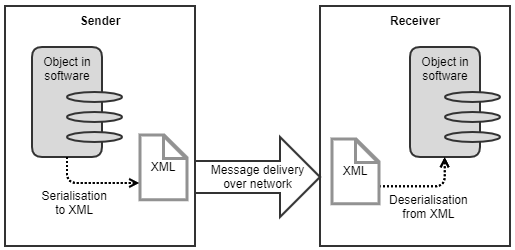Cocop.MessageSerialiser
In this page:
Introduction
This page introduces the Cocop.MessageSerialiser API to serialise (or encode) data to enable interoperability in industrial software systems. This page explains what serialisation means and provides an overview about the data types and use cases supported by Cocop.MessageSerialiser.
Serialisation (also called encoding) is necessary to communicate data between software systems and applications in a network. Consider you have an object that holds fields of data. To communicate the object to another application via a network, you must first serialise the object. The serialised object is sent as a message over the network, after which the recipient deserialises the message to an object. Please see the illustration in the figure below. In the figure, the serialisation syntax is XML (Extensible Markup Language), which is commonly supported in software development tools.

Cocop.MessageSerialiser does not restrict which protocol to choose as the communication medium. Although the API was designed with AMQP (Advanced Message Queueing Protocol) and RabbitMQ in mind, the choice can as well be MQTT, HTTP or whatever you find the best.
In industrial communication, there are needs to serialise multiple types of data. Numeric measurement values are most typical. However, depending on the use case, you may also need other types, such as booleans, enumeration values, complex data records and time series. Some scenarios necessitate request-response communication of these, possibly with filters specified for requests. In industrial systems, production scheduling is another common need.
To ease the development and upkeep of industrial software, the serialisation format should apply open standards. Traditionally, industrial communication has relied on proprietary media, such as fieldbuses or other vendor-specific APIs. These have strengths, but the communication approach is cheaper to modify and upkeep if it is decoupled and based on open standards. This adds flexibility to updates and reduces the need for any vendor-specific expertise. On the other hand, standards enable interoperability between systems, which is an essential goal in modern systems integration. In some occasions, standards, such as OPC DA and OPC UA, are already applied. OPC DA has no proper support for security features and requires a Windows platform. OPC UA solves these issues but suffers from the lack of scalability.
Cocop.MessageSerialiser API applies standards that enable loosely coupled, platform-independent systems integration. The chosen standards serialise data in XML, which does not require any specific platform for the software. With this API, virtually any software can become interoperable.
Cocop.MessageSerialiser API consists of two parts, Cocop.MessageSerialiser.Meas and Cocop.MessageSerialiser.Biz. The following sections explain the features in these.
Cocop.MessageSerialiser.Meas
This API provides the following data structures:
- measurement values of multiple types, such as:
- numeric (floating point and integer)
- boolean
- enumeration value (category)
- time instant
- time range
- array
- data record of multiple values
- timeseries data (numeric)
- metadata of measurements
- remote control of long-running tasks
- request-response communication of measurements
All the structures are based on existing open standards. The standards have been published by and are copyrighted to Open Geospatial Consortium (OGC; https://www.opengeospatial.org/ ). Because the standards are complex and versatile, the API selectively implements what is considered most important in industrial systems. To guarantee interoperability, the API implements a profile that covers a subset of the standards. In addition, there are COCOP-specific extensions not included in the standards, but these are few.
Access the API
- Profile specification (XML): https://github.com/kannisto/Cocop.MessageSerialiser.Meas_spec
C#/.NET
- Source code: https://github.com/kannisto/Cocop.MessageSerialiser.Meas_csharp
- API doc: https://kannisto.github.io/Cocop.MessageSerialiser.Meas_csharp
Java
- Source code: https://github.com/kannisto/Cocop.MessageSerialiser.Meas_java
- API doc: https://kannisto.github.io/Cocop.MessageSerialiser.Meas_java
Author
- Petri Kannisto, Tampere University, Finland
Cocop.MessageSerialiser.Biz
This API provides data structures for the scheduling of production. The structures are based on B2MML (Business to Manufacturing Markup Language), which implements the ANSI/ISA-95 standard. B2MML is copyrighted to Manufacturing Enterprise Solutions Association (MESA International; http://www.mesa.org/en/B2MML.asp ). However, please note that only a subset of B2MML structures is supported in this API, as the API was developed particularly for the needs of the COCOP project. Scheduling is not the only area of B2MML, and this implementation omits even some scheduling-related features.
Access the API
- Profile specification (XML): https://github.com/kannisto/Cocop.MessageSerialiser.Biz_spec
C#/.NET
- Source code: https://github.com/kannisto/Cocop.MessageSerialiser.Biz_csharp
- API doc: https://kannisto.github.io/Cocop.MessageSerialiser.Biz_csharp
Java
- Source code: https://github.com/kannisto/Cocop.MessageSerialiser.Biz_java
- API doc: https://kannisto.github.io/Cocop.MessageSerialiser.Biz_java
Author
- Petri Kannisto, Tampere University, Finland
Acknowledgement

COCOP - Coordinating Optimisation of Complex Industrial Processes
https://cocop-spire.eu/
This project has received funding from the European Union’s Horizon 2020 research and innovation programme under grant agreement No 723661. This piece of software reflects only the authors’ views, and the Commission is not responsible for any use that may be made of the information contained therein.